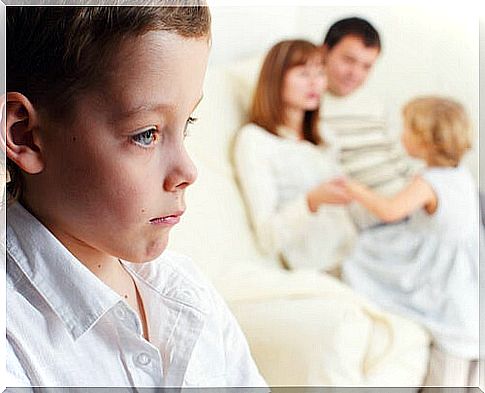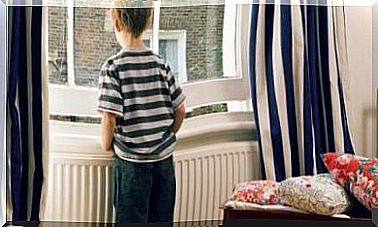Envy In Children: Causes And Solutions

Envy is a negative emotion that eats the soul of the person who feels it. In adults, it is often related to financial problems, drama in the workplace or problems in the relationship. But, what can cause envy in children? In this article, we will find out.
Envy is a feeling of wronged grief or worry about other people’s things or success, or a desire to possess something that is not ours. Although people often deny it, envy is a very normal thing to feel.
In fact, this feeling is, practically, universal. No matter how much we try to avoid it, we will, at some point in our lives, become envious. It is a natural reaction to our social environment.
In many cases, we do not feel envious because we are missing something. People who are envious can easily have a comfortable lifestyle and be relatively privileged. Despite this, they may feel bitter about the joy, the material goods, or even the opportunities that are available to others.
Envy in children: what causes it?
Envy is often provoked by things that are important to us. For the little ones, it can be the following:
- Grades in school.
- Toys, or other material possessions.
- Friends.
- Physical traits, such as being taller, thinner, or stronger.
- Attention from adults (mainly parents and teachers).

As we have mentioned, envy in children and adults is not necessarily linked to “not having” anything. In many cases, children have almost everything they could possibly want. But, when they see that a friend has something they like, they will immediately envy them, and wish they had the same.
One of the explanations for this feeling may be that these children are not used to feeling “disadvantaged” in relation to others.
They have always been the ones who have had what others would like. When the situation is reversed, they do not like it, at all.
What to do in case of envy in children
Besides, the specific situation that has triggered this feeling, envy is also caused by an underlying lack of self-confidence, affection and self-esteem, which needs to be addressed.
In other words, children who always want more, or perform better than others, often think that if they do not do this, they will not be listened to, loved or appreciated.
Below, there are a few practical tips that can help remove this bitterness.
Do not compare them with other children
Comparisons are the thief of happiness, as it is said. Do not say, “You should be a little more like Peter, who gets such good grades.” or “Why can’t you score a goal like John?”.
You do not want to motivate your child to try to perform better. In fact, you want to create a soul of unhealthy competition.
What you can do instead is set realistic goals, based on your child’s own skills. These should be achievable within a short or medium period of time so that your child continues to feel enthusiastic.
That way, instead of performing better than others, you are encouraging your child to become the best version of themselves.
Give them attention and affection
Few things are as important through childhood as feeling wanted. The attention, understanding, and respect that a child receives should not be based on grades, performance in sports, or any other form of measurement.
Make your child feel that he or she is important to you, no matter the circumstances. That way, they will not be overwhelmed with envy when a sibling or friend gets something that they would like. Parental affection is the best medicine for envy.

Talk to them about their feelings
By this, however, we do not mean that you should tell them that envy has a negative effect, or “forbid” them to feel envious of others. In fact, envy in children can even be channeled in a positive way.
How can you do that? Try to encourage some kind of healthy competition. This is if a friend gets a better grade that your child can try to make a greater effort, to improve themselves.
If another child is better at playing tennis, they might be able to train together, and encourage each other, or even play on teams together for a competition.
Envy in children can be an important driving force. However, it should always be seen as a reason to try to perform better, and never as a desire for others to perform worse.
Finally, do not forget that children’s behavior is solely a reflection of their parents. For this reason, avoid making vicious comments (especially in front of your child).
Help your child develop an understanding and appreciation of the things that others achieve.









